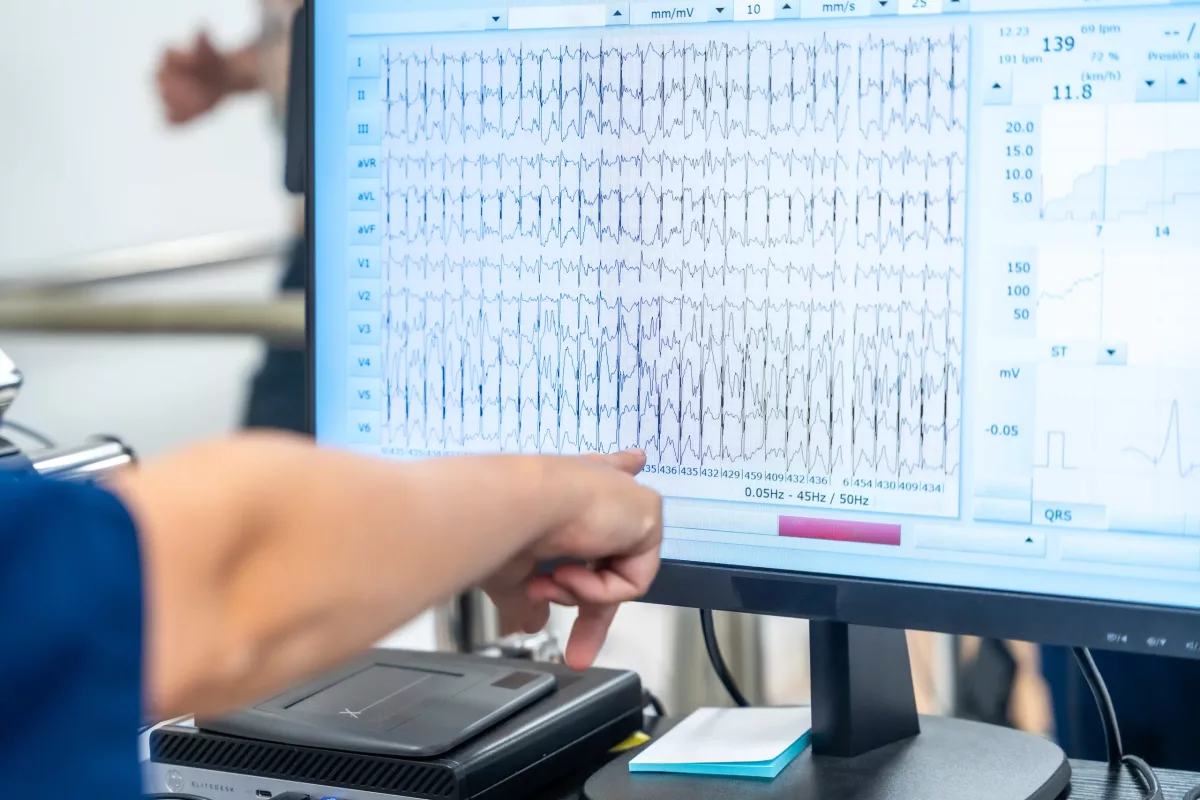A type of heart rhythm disorder that affects the heart’s sinus node (also known as the natural pacemaker), which controls heartbeats, is called sick sinus syndrome. It causes slow heartbeats, pauses, or irregular heart rhythms (arrhythmia).
This syndrome is considered uncommon, but the risk of developing elevates with aging. People with sick sinus syndrome are often treated with an implanted device (also called a pacemaker) that helps maintain a regular heart rhythm.
Sometimes, sick sinus syndrome is called sinus node dysfunction or sinus node disease.
Symptoms
Most people with this syndrome do not experience symptoms in the early stages of the disease. Some of them may notice that symptoms come and go, which makes it difficult to diagnose. Check below some symptoms of sick sinus syndrome:
- Lightheadedness
- Fatigue (extreme tiredness)
- Shortness of breath
- Bradycardia (a condition that causes a slower pulse)
- Fainting
- Dizziness
- Confusion
- Chest pain
- Palpitations (a sensation of fluttering or rapid heartbeats)
It is advised to contact your healthcare professional if any of the previous symptoms occur. Go to the nearest emergency room or call 911 in the U.S. if you experience a sudden chest pain because it may be a symptom of a myocardial infarction.
Causes
First, to understand why this condition happens, we should know how the heart normally works. So, the heart is made up of 4 chambers (two upper chambers called atria and two lower chambers called ventricles). In normal circumstances, the heartbeat is controlled by the sinus node that is located in the right atrium (the right upper chamber of the heart). The natural pacemaker (also called the sinus node) makes electrical signals that trigger heartbeats. This electrical signal goes from the sinus node across the atria to the ventricles (the two lower chambers of the heart). As a result, causing the heart chambers to contract and pump blood to the lungs and the whole body.
Usually, the natural pacemaker produces a steady pace of electrical impulses and may change depending on emotions, activity, and other factors. However, in people with this syndrome, the electrical impulses are irregularly paced, which leads to fast or slow heartbeats. Check below some causes of sick sinus syndrome:
- Certain medicines used to treat Alzheimer’s disease, arrhythmia, and hypertension (high blood pressure), such as calcium channel blockers and beta-blockers, and others.
- Damage to the natural pacemaker
- Scarring after a heart surgery
- Neuromuscular diseases (including muscular atrophy)
- Obstructive sleep apnea
- Genetic mutations (changes)
- Heart disease
- Age-related wear and tear of the heart tissues
Check also some features of sick sinus syndrome below:
- Sinus bradycardia – It occurs when the natural pacemaker produces a slow heartbeat.
- Sinus arrest – This happens when the electrical impulses pause, which causes skipped beats.
- Sinoatrial exit block – In such cases, the electrical impulses to the upper heart chambers are slowed or blocked.
- Chronotropic incompetence – Irregular heart rhythm that does not increase with physical activity.
- Tachycardia-bradycardia syndrome – It occurs when the heart rhythm alternates between a slow and fast rate.
Risk Factors
In most cases, older people experience this condition (over their 70s). Moreover, certain common heart disease risk factors also elevate the risk for sick sinus syndrome. Check below some factors that increase the risk of developing heart disease:
- High cholesterol
- Lack of physical exercise
- Excessive body weight or obesity
- Hypertension (high blood pressure)
What Are The Possible Complications of Sick Sinus Syndrome?
People with this syndrome may also experience some complications, especially if they do not get treatment. Check below some examples:
- Stroke
- Cardiac arrest
- Heart failure
- Atrial fibrillation (this is a type of arrhythmia)
Diagnosis
First, doctors perform a physical examination to check for irregularities linked with the disease and may ask some questions about the symptoms and medical history. However, if shortness of breath, dizziness, and fainting happen when the heart is beating irregularly, it indicates sick sinus syndrome. However, many people with this condition do not have symptoms.
Doctors may perform certain tests to confirm the condition and rule out other heart conditions that cause similar symptoms. Examples include:
- Electrocardiogram (ECG or EKG) – This is a painless and quick test used to measure the electrical activity of the heart. During this test, doctors will attach to the chest, arms, and legs (sometimes) some electrodes (sensors) that are connected to a computer, which displays the results.
- Holter monitor – This is a specific device used to record the heart’s activity during the day and night. It is often worn between 24 to 72 hours.
- Event recorder – This is another device that is worn for approximately 1 month (30 days). It often identifies arrhythmia. People who use this device should press the button when the symptoms happen.
- Other monitors – There are other devices (such as smart watches) that help monitor the heart’s activity. Discuss it with your healthcare professional for more details.
- Implantable look recorder – This is a small device that is implanted under the skin of the chest to record the heart activity for long periods. It is often used when the symptoms occur rarely.
Electrophysiologic Testing
This test is also known as the EP study, and it is used to screen for sick sinus syndrome. During this procedure, doctors use thin and flexible wires tipped with electrodes that are guided through blood vessels to different heart areas.
Treatment
The treatment goal is to lessen the symptoms and manage other health conditions. Healthcare professional often recommend for people with sick sinus syndrome the following treatment options. For example, regular checkups, medicines, catheter procedures, and surgery (sometimes).
People who do not experience symptoms may not need treatment. Thus, physicians recommend regular checkups.
Medicines
There are some medications that may interact with this syndrome. For example, antihypertensives, medicines used to treat heart diseases, and others. Medicines are often prescribed for people with sick sinus syndrome to prevent slow or fast heartbeats.
In most cases, physicians prescribe blood thinners (also called anticoagulants) such as Warfarin, Dabigatran, or others.
Surgery and Other Treatments
Generally, people with sick sinus syndrome need a permanent device that helps to control the heart rhythm (also called a pacemaker). This is a small device that is often placed under the skin near the collarbone. It helps stimulate the heart as required to make regular beats.
If the syndrome causes mild symptoms, the implantable device is not always needed. It depends on the electrocardiogram results, overall health, and other factors.
There are multiple pacemaker types, and which one is the best for you depends on the irregular heart rhythm you have. Check below some types of pacemakers:
- Single-chamber pacemaker – It helps carry the electrical impulse to the right ventricle (lower heart chamber) of the heart.
- Dual chamber pacemaker – It is often recommended by doctors to pace the right lower heart chamber and the right upper heart chamber separately. Moreover, this is the most commonly used pacemaker for people with sick sinus syndrome.
- Biventricular pacemaker – It is also called cardiac resynchronization therapy and is mostly used in people who have heart failure. It works by stimulating both ventricles (lower heart chambers) to make the heart beat more efficiently.
When the heart rhythm is irregular despite pacemakers and medicines, you may need additional procedures to correct and control it. Doctors often recommend a catheter-based procedure known as cardiac ablation. This procedure uses cold and heat to make small scars in the heart. It helps restore a normal heart rate.
Home Remedies
Check below some tips that may help reduce the risk of heart disease:
- Dietary changes – Add to your diet heart-healthy foods such as fresh fruits, vegetables, whole grains, fish, lean meats, poultry, and dairy.
- Regularly perform physical exercise – It is advised to aim for at least 30 minutes of exercise per day.
- Manage chronic health conditions (including high blood pressure, diabetes, and others)
- Quit smoking or never begin
- Limit or avoid alcoholic beverages
- Do not use illegal drugs
Frequently Asked Questions
What are the symptoms of sick sinus syndrome in humans?
The most common symptoms noticed in people with this syndrome include dizziness, fainting, breathing problems (such as shortness of breath), and fatigue (extreme tiredness). However, most people with this condition do not experience symptoms.
Can sick sinus syndrome be cured?
Generally, this is not a curable condition, but with a pacemaker and regular checkups, you can lessen the symptoms and improve your quality of life.
What medicine is used for sick sinus syndrome?
Commonly, physicians prescribe anticoagulants (also called blood thinners) to prevent slow or fast heartbeats. Usually, they recommend Warfarin or Dabigatran. Ask your healthcare provider if you have additional questions.




